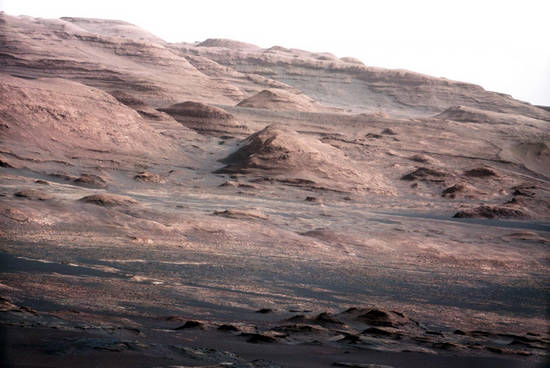 |
|
The base of Mars' Mount Sharp - the rover's eventual science destination - is pictured in this August 27, 2012 NASA handout photo taken by the Curiosity rover. The image is a portion of a larger image taken by Curiosity's 100-millimeter Mast Camera on August 23. Scientists enhanced the color to show the Martian scene under the lighting conditions we have on Earth, which helps in analyzing the terrain. [Photo/Agencies] |
LOS ANGELES - The first recorded human voice that travelled from Earth to Mars and then back to Earth was released Monday at NASA's Jet Propulsion Laboratory (JPL) in Pasadena, California.
The voice playback was released along with new telephoto camera views of the varied Martian landscape during a news conference at JPL.
In spoken words radioed to the Mars rover Curiosity and then back to NASA's Deep Space Network (DSN) on Earth, NASA Administrator Charles Bolden congratulated NASA employees and the agency's commercial and government partners on the successful landing of Curiosity earlier this month.
"Curiosity will bring benefits to Earth and inspire a new generation of scientists and explorers, as it prepares the way for a human mission in the not too distant future," said Bolden in the recorded message.
"With this voice, another small step is taken in extending human presence beyond Earth, and the experience of exploring remote worlds is brought a little closer to us all," said Dave Lavery, NASA Curiosity program executive.
The telephoto images beamed back to Earth show a scene of eroded knobs and gulches on a mountainside, with geological layering clearly exposed.
The new views were taken by the 100-millimeter telephoto lens and the 34-millimeter wide angle lens of the Mast Camera (Mastcam) instrument.
Mastcam has photographed the lower slope of the nearby mountain called Mount Sharp, according to JPL.
"Those layers are our ultimate objective. The dark dune field is between us and those layers. This is a very rich geological site to look at and eventually to drive through," said Mastcam principal investigator Michael Malin.
A drive early Monday placed Curiosity directly over a patch where one of the spacecraft's landing engines scoured away a few inches of gravelly soil and exposed underlying rock.
Researchers plan to use a neutron-shooting instrument on the rover to check for water molecules bound into minerals at this partially excavated target, JPL said.
The rover team at JPL reported results of a test on Curiosity's Sample Analysis at Mars (SAM) instrument, which can measure the composition of samples of atmosphere, powdered rock or soil.
The amount of air from Earth's atmosphere remaining in the instrument after Curiosity's launch was more than expected, so a difference in pressure on either side of tiny pumps led SAM operators to stop pumping out the remaining Earth air as a precaution. The pumps subsequently worked, and a chemical analysis was completed on a sample of Earth air, according to JPL.
"As a test of the instrument, the results are beautiful confirmation of the sensitivities for identifying the gases present," said SAM principal investigator Paul Mahaffy of NASA's Goddard Space Flight Center in Greenbelt, Md.
"We're happy with this test and we're looking forward to the next run in a few days when we can get Mars data," Mahaffy added.
Curiosity already is returning more data from the Martian surface than have all of NASA's earlier rovers combined, according to JPL.
"We have an international network of telecommunications relay orbiters bringing data back from Curiosity," said JPL's Chad Edwards, chief telecommunications engineer for NASA's Mars Exploration Program.
He said Curiosity is boosting its data return by using a new capability for adjusting its transmission rate.
Curiosity is three weeks into a two-year prime mission on Mars. It will use 10 science instruments to assess whether the selected study area ever has offered environmental conditions favorable for microbial life.